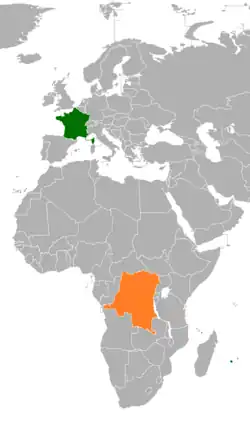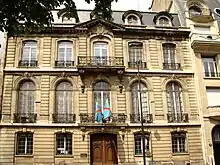 | |
France |
DR Congo |
|---|---|
DR Congo–France are the bilateral diplomatic relations between the Democratic Republic of the Congo and France. Both nations are members of the Organisation internationale de la francophonie and the United Nations.
History
In 1961, France sent colonel Roger Trinquier to support the coup d'etat of Mobutu Sese Seko.[1] In December 1963, Following the suppression of the Congo Crisis, France entered into a treaty with Zaire, focusing on cultural and technical cooperation. Mobutu's coup in 1965 deepened the relationship between Zaire and France. Though, Mobutus first goal of the creation of a Union of Central African States, a political and economic union between Chad, Zaire, and the Central African Republic, but aimed to form a pole of attraction for other states. The French took this as a serious threat and launched a diplomatic counterattack. French emissaries prevailed upon the Central African Republic to withdraw from the UEAC, which then limped along for several years as a partnership of Chad and Zaire, which lack a common border. Under France's President Charles de Gaulle, who had been interested in the continent for many years, African affairs became part of the "reserved domain" of the president.
Valéry Giscard d'Estaing decided to send the French Army to Zaïre in 1977 to help Mobutu, whose régime threatened to crumble before rebels of the Congolese National Liberation Front in the Shaba I war. France intervened again the following year in the Shaba II war.
France was hesitant than the western powers to condemn the Mobutu regime or to cut off support. France did not cut off aid following the killing of students at Lubumbashi in May 1990, a step taken by Belgium, the EC, Canada, and the United States. France and Belgium both sent troops to restore order and protect foreign nationals in the aftermath of a mutiny and violence by unpaid paratroopers in Kinshasa in September 1991. Then, as events unfolded in Zaire, France, too, cut off economic aid to Zaire in October 1991. In addition, the French government, together with Belgium and the United States, in 1992 put pressure on President Mobutu's government to proceed with the national conference and to hold multiparty legislative elections that year.
In August 1992, France warmly endorsed the Tshisekedi government, exhibiting far fewer reservations on its viability than Belgium and the United States. The prospect of renewed French aid to Zaire also was addressed.
In September 1993, a new French ambassador arrived in Kinshasa. The appointment made France one of the few Western nations to maintain normal diplomatic relations with Zaire. Most other countries have reduced representation to the Chargé d'Affaires level.
Later in 1993, there were reports that France had tired of Tshisekedi's "intransigence" and no longer supported him as prime minister. There seems to be some evidence that French support for the Tshisekedi government is not unequivocal, as French statements appeared to offer general support for transitional political forces rather than specific support for Tshisekedi.
In the 1994 Rwandan genocide, Mobutu Sese Seko authorized France to use the Kivu region as a base for Operation Turquoise, a French military operation to put an end to the massacres in Rwanda.
Contemporary period
Culture
French is the official language of the DRC, and both France and the DRC are full members of the Organisation internationale de la francophonie (International Organization of French Speakers).
Several Alliances françaises and Instituts français operate in the RDC (notably the Institut français in Kinshasa), as well as the lycée Français René Descartes de Kinshasa. France has also trained certain Congolese administrators at the École Nationale d'Administration.[2]
Politics
France committed at the end of President Kabila's second to the European Union and the United Nations Security Council that it would enforce human rights, ldemocracy and the Congolese constitution.[3]
France provides Congo-DRC with food and medical assistance. French food aid has increased since the food crisis of 2008, reaching 17 million euros between 2008 and 2012.[4]
Economic relations
France primarily imports food and agricultural products from the DRC, whose primary imports from France are pharmaceuticals and mechanical equipment.[5]
The DRC receives support from French experts to help it improve its budgetary and administrative performance, in accordance with the debt reduction and development contract (C2D) between the two countries.[6]

Resident diplomatic missions
See also
Notes and references
- ↑ Thomas Deltombe; Manuel Domergue; Jacob Tatsita (2019). KAMERUN !. La Découverte.
- ↑ "Coopération - La France en République démocratique du Congo". cd.ambafrance.org (in French). Retrieved 2018-10-22.
- ↑ Ministère de l'Europe et des affaires étrangères. "Relations bilatérales". France Diplomatie : : Ministère de l'Europe et des Affaires étrangères (in French). Retrieved 2018-10-22.
- ↑ "Fiche sur l'action humanitaire". La France en République démocratique du Congo (in French). Retrieved 2018-10-24.
- ↑ étrangères, Ministère de l'Europe et des Affaires. "Relations bilatérales". France Diplomatie: Ministère de l'Europe et des Affaires étrangères (in French). Retrieved 2018-10-22.
- ↑ "République démocratique du Congo - Expertise France". www.expertisefrance.fr (in French). Retrieved 2018-10-24.
.svg.png.webp)